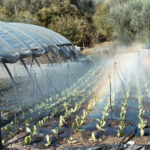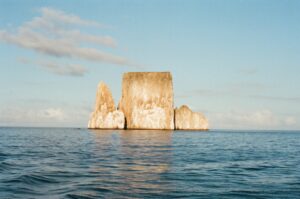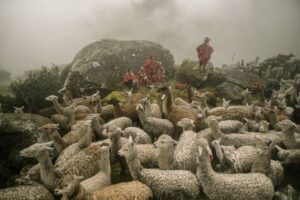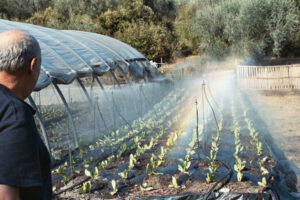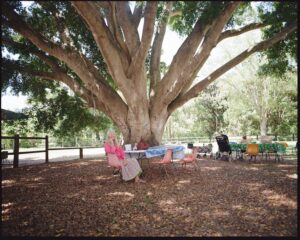I was invited to Davos by Rudy Randa, the Managing Director of the Boa Foundation. Rudy was attending the World Economic Forum (WEF) to gather support for indigenous-led land buyback and reforestation projects, a key focus for Boa.
Originally founded by Klaus Schwab in 1971 as the European Management Forum, the World Economic Forum is a not-for-profit foundation focused on creating a more fair, inclusive, just and sustainable world through the cooperation of international public and private institutions. The WEF is guided by stakeholder theory — which is predicated on the belief that an organisation should be accountable to all aspects of society — and through its annual meeting in Davos, it brings together corporate and government leaders to discuss the most pressing global issues of the moment.
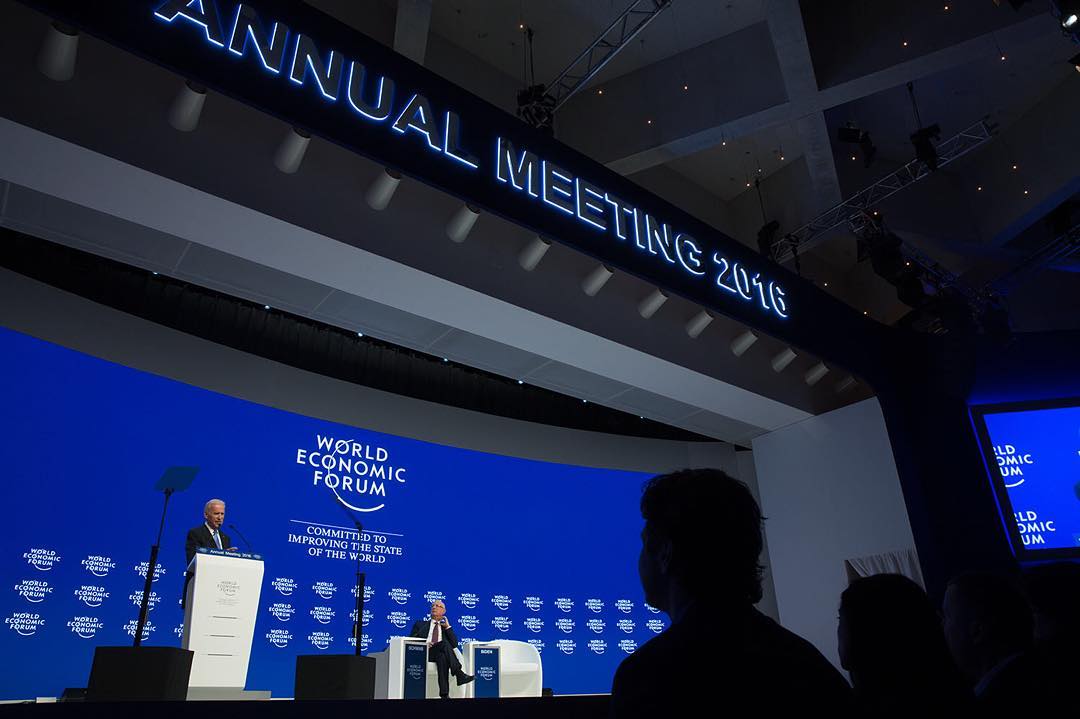
Rudy and I were attending the WEF with Ben Meeus from Grounded and the Yorenka Tasorentsi Institute; Ana, Daniel, Carrie and Pascal from the Aguila Condor Foundation, one of Boa’s partner organisations; and Carlos Vicente from the Interfaith Rainforest Initiative. Each day our group gathered at a stall in the Trust House, which was facilitated by yeswetrust, a members club focused on positive global change.
After helping to organise our stall on the first morning, I walked to the meeting room, which hosted talks and events each day of the WEF, from nine in the morning until midnight. When I entered, a man stood on the stage wearing a wide-brimmed hat with what looked like a macaw feather attached to it. He was explaining how a global game could be an antithesis to the nation state system and a solution to global problems. After introducing the concept, he invited the audience to gather in a circle for a visualisation exercise. His colleague then stepped into the centre of the circle, holding a microphone. She spoke softly, guiding the group into meditation, asking everyone to visualise a thriving abundant planet. She then asked the participants to focus on the finer details of this planet, and then to focus on a single detail: “this is the part of the planet that you most care about.” She finally guided everyone out of the visualisation, back into the room and invited the participants to share their single observation.
The first speaker spoke with a Polish accent of a planet going through a great reset, which led to free healthcare and universal income. The next speaker spoke with an American accent about a magical nut that grows in the Andes. A woman with an Indian accent spoke of women’s rights and safety, which was celebrated by the next speaker, who spoke with an Eastern European accent about the importance of living with our hearts. An American woman spoke to the importance of living in alignment with personal truth. Next to her, a British man introduced a Sanskrit term, ahimsa, as the necessary core value of his world. An American man shared an indigenous prophecy of a new humanity living in harmony with one another and the world. A man with a Dutch accent spoke of the wisdom of the forest, referring to the previously mentioned principle of ahimsa and the need to truly collaborate and honour the value of all living beings. Finally a woman introduced herself as Ukrainian and spoke to the importance of peace. At this point, the man who introduced the game asked for the microphone and spoke to collective consciousness and the wisdom within it. He asked the group “what does the world look like when love wins”, inviting everyone to think of themselves at Davos as part of a collective we, to connect to the collective purpose, to be together in the here and now, and to connect with “the power of Gaia”. Everyone clapped. The session ended and the audience dispersed, with most people gathering at the bar or around a self-service coffee machine where they exchanged business cards and LinkedIn profiles.
I walked to our stall where Ben and Carlos were offering a VR experience called Amazônia Viva. This 360 degree immersive experience transports viewers to the Tapajós River in Brazil, where their 10 minute journey is guided by Raquel Tupinambá, an indigenous leader from the Surucuá community. There were three headsets at our stall, and as I returned a woman took off one of them, revealing her wide excited eyes. She spoke animatedly to Ben.
“It took me out of this Davos chaos and into a world I could feel was sacred. Thank you so much.”
Ben looked over to me and raised his eyebrows while smiling, clearly excited by the enthusiastic response he had received. I smiled back, then felt a wave of tiredness, so I decided to get a coffee. I walked to the self-service machine, passing a few of the nearby stalls. The first was focused on technology that promises a longer lifespan. The next consisted of an air mattress that a man was lying on while wearing headphones and VR goggles. The stallholder had been watching my gaze and as our eyes met he raised his eyebrows. I nodded towards the guy on the floor. What is he doing?
“It’s sonic technology that reduces stress and increases creativity.”
If it’s sonic what is happening in the goggles?
“It’s a light display that moves and evolves with the soundscape.”
I smiled and walked the remaining steps to join the queue for the coffee machine. As I waited, I looked around the room, appreciating how everyone seemed to be there to share what they perceived was most valuable to the world, reflecting the WEF’s belief in stakeholder theory, how our work should benefit all facets of society. I then closed my eyes, conducting my own visualisation exercise: what do I feel is most valuable, what does our world need?
I was abruptly pulled from my meditation by someone tapping on my shoulder. It was the person standing behind me, “it’s your turn.” I placed a paper cup in the centre of the tray and looked at the options on the screen and pressed FLAT WHITE. I walked back to our stall while sipping my coffee. I took my phone from my pocket and checked the calendar of events I had for the day. “11:00am – Big Questions: Cannabis & Psychedelics.” I looked at the current time at the top of my screen, it was 10:50am, so I gathered my belongings and rushed to the nearby hotel where the talk was held.
The WEF’s Annual Meeting are the sessions within The Congress, the exclusive area where political and corporate leaders gather each day, which requires an official invitation or a $19,000 (USD) ticket. This year, Congress speakers included Sam Altman, the CEO of OpenAI; Bill Anderson, the CEO of Bayer; Albert Bourla, the CEO of Pfizer; Sadie Creese, Professor in Cybersecurity at the University of Oxford; Mafalda Duarte, the Executive Director of the Green Climate Fund; Bill Gates, the Founder of Microsoft; David Gelles, the Managing Correspondent of The New York Times; Kristalina Georgieva, the Managing Director of the IMF; António Guterres, the Secretary-General of the United Nations; Mike Henry, the CEO of BHP; Nicolas Hieronimus, the CEO of L’Oréal; Jeremy Hunt, the Chancellor of the Exchequer in the UK; Paul Kagame, the President of Rwanda; Christine Lagarde, President of the European Central Bank; Emmanuel Macron, the President of France; Lynn Martin, the President of the New York Stock Exchange; Javier Milei, the recently elected President of Argentina; Jennifer Morris, the CEO of The Nature Conservancy; Sri Mulyani Indrawati, the Minister of Finance of Indonesia; Ngozi Okonjo-Iweala, Director-General of the WTO; Chief Putanny of the Yawanawá people of the Brazilian Amazon; Tharman Shanmugaratnam, the President of Singapore; Kadri Simson, the Commissioner for Energy at the European Commission; Jürgen Stock, the Secretary-General of INTERPOL; Jens Stoltenberg, the Secretary-General of NATO; Mohammed Shyaa Al Sudani, the Prime Minister of Iraq; Nisia Trindade Lima, the Minister of Health in Brazil; Kathy Wengel, the Executive Vice-President of Johnson & Johnson; Volodymyr Zelenskyy, the President of Ukraine; and many others, including a dabble of entertainers like Angelique Kidjo, Nile Rodgers and Michelle Yeoh.
Surrounding The Congress, along Davos’ Promenade, are the various “houses” convened by organisations and governments, which can be visited by anyone willing to travel to Davos and pay the exorbitant rates for a nearby hotel room during the WEF. While walking along the Promenade, I spotted the AI House, Equality Lounge, Greek House, Maharastra House, Meta House and Uber House, all of which have taken over the usual stores that line Davos’ high street, and have been repurposed to host branded events and experiences.
I arrived at the Mountain Plaza Hotel, which wasn’t a “house” per se, as it lacked the customary branding. I had no idea where the talk was, so I asked the receptionist where is the cannabis and psychedelics event. “Go down that hall,” they pointed to a door behind me, “and take the elevator to level three.” I followed her instructions, which led me to a makeshift foyer on the third floor: there were two coat racks to my left, three tables serving food and drinks directly in front of me, and what now appeared to be the standard Davos self-service coffee machine to my right. There were also two signs indicating “Room A” and “Room B”. The door to “Room A” was open, and I could see nobody was inside, so I assumed the talk was in “Room B”. I opened the door, all the seats were taken, people were standing at the back, the room was full and the session was underway, so I smiled and closed the door. I made my way back to the Promenade and slowly walked by the branded houses to the “Table of Tomorrow” lunch, at the United Nations’ Sustainable Development Goals (UNSDG) Tent, which was next on my schedule.
The UNSDG Tent was a well-heated marquee with two meeting rooms, a toilet and a bar area. The lunch was in the smaller of the two rooms, where seven tables faced a small stage, and was organised by Bayer, the German pharmaceutical and biotechnology company that also creates fertilisers and seeds for agricultural use; and Clim-Eat, an organisation focused on the intersection between food and climate to create collective action for a sustainable and healthy future. As attendees entered the room, they found their assigned seat at their assigned table. I put my jacket on the back of my chair and introduced myself to the man seated beside me, Franck, who worked at Innovate 4 Nature, a Swiss-based accelerator for “nature-positive solutions”. We swapped stories from our time in Davos until the host of the lunch, Professor David Nabarro, stepped onto the stage. He held a microphone that he used to introduce himself — “I am the Co-Director of the Institute of Global Health Innovation at Imperial College London and Strategic Director of the social enterprise 4SD” — the topic of the lunch — “over the past few years we’ve experienced a storm, where food insecurity and malnutrition are on the rise” — and to explain how the next two hours had been organised — “we’re going to enjoy great food, listen to great speakers, and discuss approaches to this significant moment in our collective history.”
The two speakers were Jennifer Baarn from the Alliance for a Green Revolution in Africa, and Arnold Puech Pays d’Alissac, the President of the World Farmers’ Organisation. Both organisations, along with Clim-Eat, are partners of Bayer, so their perspectives were aligned. They spoke of the power of innovation and technology to ensure sustainability, equity and resilience in our food systems; how seed inputs increase yields; and how corporations provide knowledge and innovation to farmers. They also agreed how long-term trusting partnerships and stable investment were crucial to future food systems. When they finished speaking, Dhanush Dinesh and Leanne Zeppenfeldt from Clim-Eat spoke to the next phase of the lunch, facilitated conversations on each table. I don’t recall much of this conversation and I didn’t take notes, but what I found interesting and memorable were the different backgrounds and careers of the people surrounding me. It is easy to look at people and classify them as “corporate” or “in government” forgetting they have a personal history defined by an assortment of choices that led them to that room on that day. This thought inspired questions as I left the event and walked back to Trust House: what led me to that room, and where am I going?

I arrived back to our stall and sat down on a free chair. I watched Ben and Carlos speak with people who had just finished the Amazônia Viva experience, how they spoke of the Amazon rain forest with passion, fuelled by their belief in nature as a solution to the climate crisis. I turned my head to see Rudy speaking with a man about the Yorenka Tasorentsi Institute, and the importance of indigenous-led projects to support the protection and regeneration of vital ecosystems. Watching my friends and colleagues discuss the projects that brought them to Davos reminded me of why I was there too.
It’s easy to forget what moves us as individuals, our minds are so easily pulled into the conceptual thinking of Occidental knowledge systems through discussions on trickle-down economics, government budgets and impact investments. It’s easy to forget my why when I meet a confident entrepreneur and listen to how engaged they are with the solution they believe the world needs. Media platforms are predominantly focused on reporting problems that encourage anxious thought patterns, news that highlights what makes us weak rather than celebrating what makes us strong.
It was in that moment I was approached by Lars Bergmann, who was invited to join our group at the WEF by his long-time friend Daniel, from the Aguila Condor Foundation. Lars has worked in wastewater treatment for over 20 years. The first line of his LinkedIn profile explains how he is a “passionate innovator and tech enthusiast”, but when speaking with him, I learned how much he loves his wife and daughter, and how his focus on water is centred on its necessity to humanity and the systems we call life. He explained the technology and thinking that defines his work, how it transforms wastewater by removing polluting elements so that it can then be potentially reused for irrigation. I asked him why water is not a bigger talking point at Davos?
“I am surprised by this too.”
We spoke about the droughts that are now so prevalent in the world. I told Lars the story of how Rudy and I fought wildfires in the Amazon rain forest in September.
“How did it change you?”
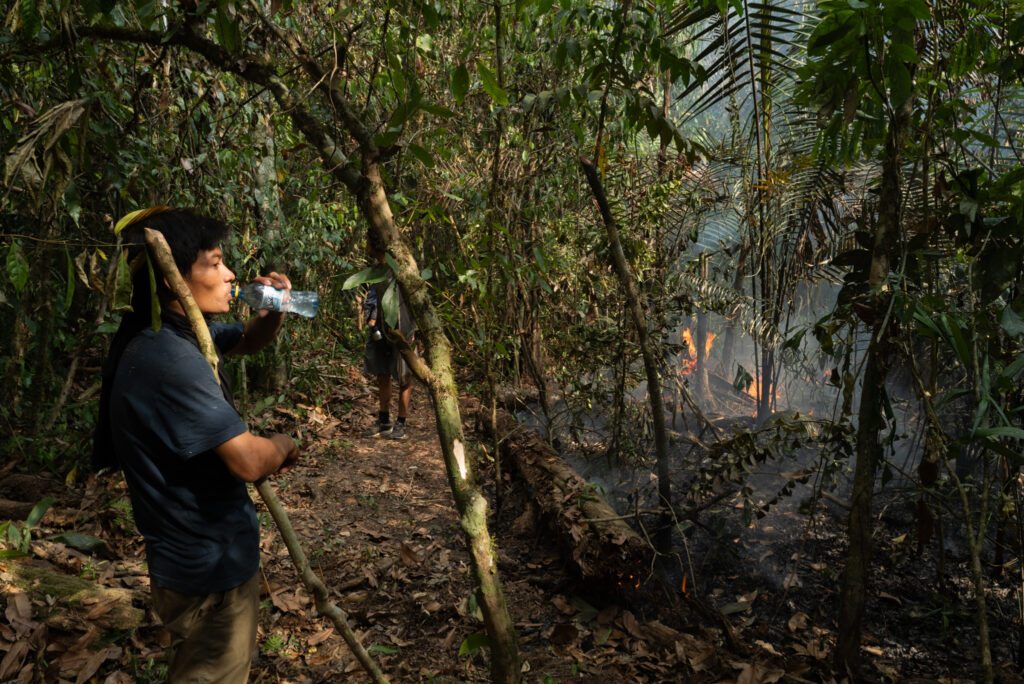
Nobody had asked me that question since the experience. I responded how it was powerful to think back to that moment, how confronted I was to witness the drying of one of the world’s most precious freshwater systems, to see it overwhelmed by flames, and how far away it was from the WEF, from everyone explaining how their project or idea will solve global problems, and how speaking about solutions was not the antidote to the issues we face. Although they may lead to action, and I hope they do, because immediate action is necessary.
“So what is immediate, necessary action?”
Another good question, an important question, a question I left the WEF asking myself. A question I ask myself now, sitting here, writing. I don’t have an answer. If anything, I think the answer is another question with slightly more specificity.
What action am I focused on?
Or with even more specificity.
How can I nurture our world today?
Anton Rivette is a writer and photographer. He leads storytelling at eco-nnect.




